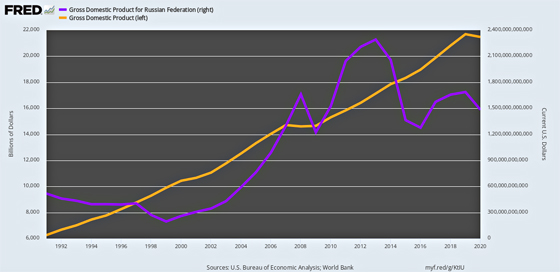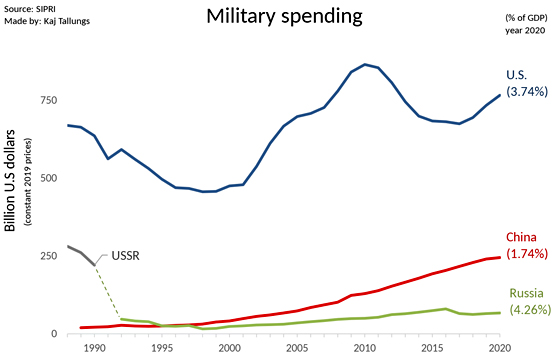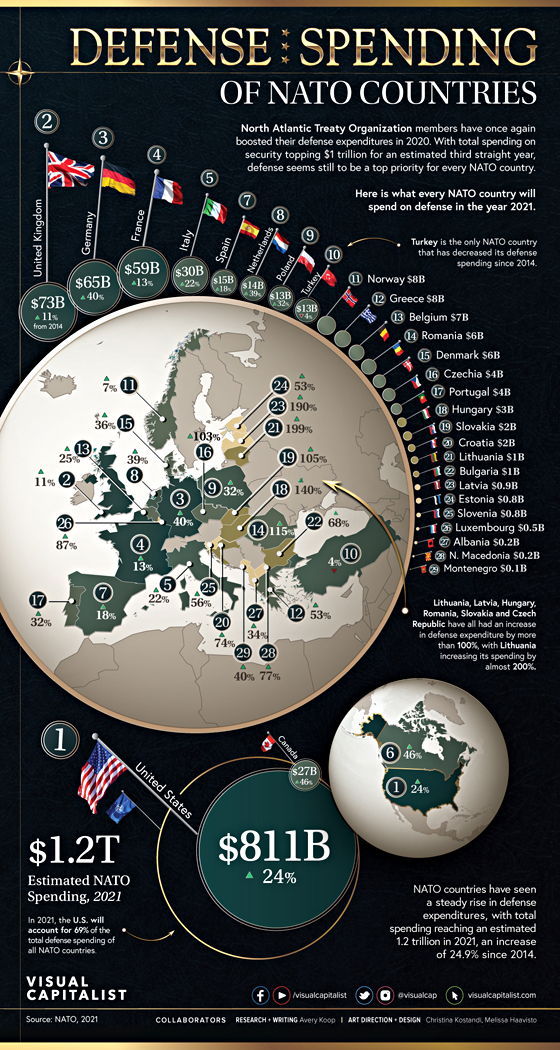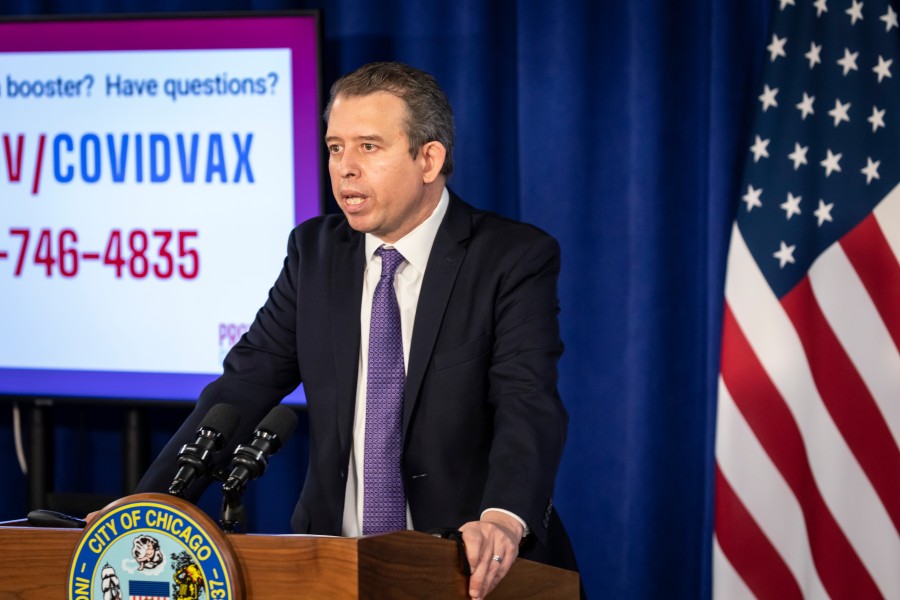One of the worst aspects of the internet enabled 24/7 news cycle is the giant memory hole embedded within it. That is to say, if the latest information content is “breaking news”, no matter how incidental, trivial, misleading or flat-out untruthful, it makes the cut.
But more often than not, that’s all she wrote. Context and history get minimized at best and downright obliterated most of the time. That’s clearly the case with the ongoing saga of the alleged Russian threat to America’s security and especially the manifestation of that threat in the Ukrainian theater of confrontation.
The truth is, owing to the endless “breaking news” syndrome, the Ukraine matter is a national security molehill that’s been transformed into a mountain. The culprit was Washington’s phalanx of think-tanks, NGOs, the military-industrial-congressional complex, and, most especially, the neocon lumpen-intelligentsia that has insinuated itself into every nook and cranny of the national security apparatus from the Congressional committees of jurisdiction to the permanent bureaucracy at Foggy Bottom, Langley Virginia and countless nodes of hegemonic power in between.
In the first place, why in the world would any thinking person assume that Russia is a military threat to the US and/or the whole of NATO when it’s an absolute economic midget comparatively speaking?
Back in 1991 when the old Soviet Union collapsed, the corpus which remained called the Russian Federation had a GDP of $518 billion or just 8.3% of the US. And it’s not as if Russia has been on a post-communist growth-tear ever since. By 2020, Russia’s GDP of $1.48 trillion (purple line) had actually slipped further to just 6.9% of the $21.5 trillion GDP (yellow line) posted by the US.
USA GDP (Left Axis) Versus Russia GDP (Right Axis), 1991-2020

Of course, on top of that yawning gap in terms of economic wherewithal to mount a military threat in this age of high tech, capital intensive warfare (as opposed to military might based upon conscripted human canon fodder), there is an additional $18.5 trillion of European/NATO GDP. So NATO as a whole has $40 trillion of GDP or 27X the paltry economic output of Russia.
Nor are we talking mere economic theory here. At the end of the cold war, the military spending of the old USSR was estimated at $300 billion compared to US defense expenditures of about $675 billion (both in 2019$). But that 2.3:1 ratio is what killed the old Soviet Union because it depended upon a forced draft military call on the wheezing economic output of the state-controlled Soviet economy, thereby precluding the hopes of its enslaved citizens for a living standard even a fraction of what was self-evidently prevalent in the West.
When the Soviet Union shuffled off the pages of history in August 1991, however, as shown by the green line in the chart below, military spending by the successor Russian Federation collapsed to barely $30 billion by the mid-1990s. That represented a breathtaking 90% reduction from the level absorbed by the Soviet War Machine in its dying days. It was the greatest peaceful disappearance of a major military power in the history of the world.
That should have been the clarion call for peace and demobilization of the US and NATO war machines, as well, since at the time the only other candidate to succeed the USSR was so-called Red China. But its new leader, Deng Xiaoping, had made an immense discovery that had evaded the Great Helmsman during the course of his entire bloody rule: Namely, that power flows better from a government printing press than the barrel of a gun as per Chairman Mao’s formula for totalitarian rule.
Accordingly, China became focused on invading America’s 4,000 Walmarts with cheap goods from its mushrooming export factories, not military conquest of California or anything else outside its own historical sphere of influence.
Alas, the giant American Warfare State was not about to demobilize, even if the post-Cold War strategic reality begged for it. After a brief decline of US military spending in the mid-1990s to about $475 billion (2019$), the military/industrial/surveillance complex was soon off to the races again, with real defense spending soaring way above Cold War peak levels after the turn of the century.
That is to say, from the mid-1990s low point real US military spending has rebounded by about +$300 billion per year, while Russian spending at the current $65 billion level is up by only +$35 billion. If there has been a rearmament race, therefore, Washington has been leading it and is winning by a country mile.

So here’s the thing. What kind of crackpot thinking holds that Cool Hand Vlad is oblivious to this reality, and is therefore bound and determined to poke the USA/NATO military colossus in the eye out of some revanchist obsession with recovering the lost Soviet empire?
That is, where is the logic or evidence for the notion that Russia is an aggressive, expansionist threat to NATO Europe, to say nothing of the continental United States?
You can accuse Vladimir Putin of many transgressions including robbing his own countrymen blind and making a mockery of what passes for democracy in post-communist Russia. For all we know, he might even be the “killer” of his own citizens that Sleepy Joe accused him of being.
But what he is not is rash, stupid, delusional or suicidal. There is not a snowball’s chance in the hot place that he would even dream of a preemptive nuclear challenge to America’s 2,400 deployed nukes at land (Minutemen missiles), sea (Trident subs)and air (B-1 stealth bombers).
At the same time, mounting the conventional capacity to invade and occupy any significant part of Europe, let alone the American homeland, would crush Russia’s ragged commodity-based economy long before the tanks could roll through the Brandenburg Gates or the dozens of carrier battle groups needed to threaten the American homeland could be procured, built and put to sea in the Atlantic and Pacific.
In a word, America’s security vis-à-vis Russia rests on a rock solid foundation of a triad nuclear deterrent, which was bought and paid for decades ago; the great ocean moats on either coast of North America, which have kept enemies at bay since the beginning of the Republic; and the pitifully small and technologically-wanting Russian economy that is incapable of mounting a credible military challenge.
In fact, when it comes to overall NATO defense spending – 95% of which is for conventional forces – the story is even more lopsided. Here is the current array of defense spending by NATO member, which is estimated to total $1.2 trillion in 2021 or 18X more than Russia’s military outlays.
Moreover, that staggering figure represents a $240 billion or 25% increase from total NATO outlays as recently as 2014, the year during which tension with Russia turned hot owing to the Washington sponsored and funded coup against the democratically elected government of Ukraine. That is, just in the last seven years NATO military outlays have increased by 2.7X the total amounts of Russian military spending ($65 billion).
Indeed, when you look at the chart below, you might well forgive Putin for being a tad paranoid about the intentions of Washington and Brussels. The United Kingdom’s military spending of $73 billion alone exceeds that of Russia, while the combined $125 billion defense spending of Germany and France is nearly double the Russian military budget.
And, of course, from there the contributions of the lesser NATO powers march on in lockstep – starting with $30 billion by Italy and $27 billion by Canada. Yet the latter surely is among the great anomalies of ours times. That is, who is Canada’s defense budget directed against – perchance an invasion by Russia? The United States!
Indeed, Canada’s swollen defense budget and like and similar outlays of $15 billion by Spain, $14 billion by Netherlands, $8 billion by Norway and $6 billion by Denmark, to take some random examples, get to the rotten core of the matter.
To wit, these are not “defense” budgets stood up against a plausible external enemy. Instead, they are the auxiliary mercenary forces commissioned by Washington to create a fig leaf of international sanction for its self-appointed task as policeman of the world. The fact that virtually every one of these countries sent fighting forces, albeit frequently just token operations, to Afghanistan tells you all you need to know.
For crying out loud, what statesman in Canada, Norway or Germany actually believed that the Taliban was a threat to their homeland security or that who controlled the godforsaken expanse of the Hindu Kush mattered a whit to the future of the planet?
No, it was about satisfying Washington’s requisition of “allied” troops for its latest self-conferred global policing mission. That is, NATO is not at all about legitimate defense against plausible military threats to the 29 homelands comprising the mutual “defense” pact.
To the contrary, it’s a $1.2 trillion do-gooders society that marches to the tunes called by Washington hegemonists, interventionists, busy-bodies and career national security apparatchiks who thrive and prosper on attempting to rule the affairs of the fairer part of the planet.
So doing, they have created an absurdity that is even more preposterous and dangerous than those which led to the dues ex machina type mobilizations of the Great War and the carnage in the trenches of northern France which it fostered. That is to say, what kind of mutual benefit for the United States, and the major powers of Europe for that matter, is there in a needless military alliance that triggers Article 5 obligations for the likes of the following military ciphers:
Estimated Defense Spending:
- Croatia: $2 billion;
- Lithuania: $1 billion;
- Bulgaria: $1 billion;
- Latvia: $0.9 billion;
- Estonia: $0.8 billion;
- Slovenia: $0.8 billion;
- Albania: $0.2 billion;
- North Macedonia: $0.2 billion;
- Montenegro: $0.1 billion.
For crying out loud. These countries are all within the shadows of the Russian border – the American equivalent of the Caribbean and central America – and now only dare to poke the Russian bear owing to the protective shield of NATO’s Article 5 mutual defense obligations.
By contrast, what the hell is in it for the national self-interest and security of the United States? Does anyone in their right mind think that Russia actually intends to invade and occupy these neighboring countries at the staggering costs which would surely cause the demise of its own rickety economy?
Likewise, would annexing what would be surely the hostile remnants of the old Warsaw Pact make Russia a more formidable military threat to western Europe and North America than it isn’t now?
To the contrary, the likely result would be to make Russia a slight variation of Nixon’s famous pout: A pitiful, helpless midget.

At the end of the day, the entire Russian threat narrative is based on a structural absurdity: Namely, that given the vast disproportion of economic girth and military might between NATO and the Russian Federation that Moscow’s steely-eyed ruler (there are no committees, coalitions or alliances in Putin’s Russia to complicate strategy) is hell bent on committing national suicide in behalf of reviving the old Soviet Empire – which itself is a canard invented in the Washington beltway, not a strategy that Putin has ever advocated or taken steps to realize.
We have treated elsewhere in greater detail on the Ukrainian matters per see, but suffice it here to say that the whole bloated, misbegotten enterprise of NATO expansion since 1991 could very well be read in Moscow as an existential threat.
In the first place, it is beyond dispute that President George Bush the Elder and Secretary of State James Baker promised Moscow that in return for the unification of Germany and its membership in NATO, that the latter would not be extended “a single inch to the east”.
After embracing 14 former Warsaw Pact members, you could say that a world historic double-cross has occurred and for what reason?
Just consider the opening chapters in the 1990s. In her ridiculously self-serving memoir “Madame Secretary,” former U.S. ambassador to the United Nations and secretary of state Madeleine Albright made abundantly clear that Clinton administration officials decided already in 1993 to endorse the wishes of Central and East European countries to join NATO. So doing, they ash-canned the Bush-Baker promises hardly before the ink was dry.
As Ted Galen Carpenter recently noted,
The Alliance proceeded to add Poland, the Czech Republic, and Hungary in 1998. Albright admitted that Russian President Boris Yeltsin and his associates were extremely unhappy with that development. The Russian reaction was understandable, since the expansion violated informal promises that President George H. W. Bush’s administration had given Moscow when Mikhail Gorbachev had agreed not only to accept a unified Germany but a united Germany in NATO. The implicit quid pro quo was that NATO would not move beyond the eastern border of a united Germany.
1995 air war against Bosnian Serbs seeking to secede from the newly minted country of Bosnia-Herzegovina and the imposition of the Dayton Peace Accords greatly annoyed Yeltsin’s government and the Russian people. The Balkans had been a region of considerable religious and strategic interest to Moscow for generations, and it was humiliating for Russians to watch impotently as a U.S.-led alliance dictated outcomes there. The Western powers conducted an even greater provocation four years later when they intervened on behalf of a secessionist insurgency in Serbia’s restless Kosovo province. Detaching that province from Serbia and placing it under U.N. control not only set an unhealthy international precedent, but the move also displayed utter contempt for Russia’s interests and preferences in the Balkans.
The Clinton administration’s decisions to expand NATO and meddle in Bosnia and Kosovo were crucial steps toward creating a new cold war with Russia. Former US Ambassador to the Soviet Union Jack F. Matlock Jr. cites the negative impact that NATO expansion and the U.S.-led military interventions in the Balkans had on Russian attitudes toward the United States and the West: “The effect on Russians’ trust in the United States was devastating. In 1991, polls indicated that about 80 percent of Russian citizens had a favorable view of the United States; in 1999, nearly the same percentage had an unfavorable view.”
In a word, in response to the Cold War’s end Washington busybodies and hegemonists like Albright, Secretary of State Christopher Warren and State Department apparatchiks like Richard Holbrooke (author of the Dayton Accords) took upon themselves to re-make what amounted to the strategic equivalent of Mexico and central America for Russia.
After all, what possible homeland security interest was served by bombing the Bosnian Serbs or by turning Kosovo over to the brutes who sponsored the insurrection against their equally brutal rulers in Belgrade?
Needless to say, the answer is less than none. It didn’t matter a whit what happened in the latter day remnants of the Balkans to America’s security, but the rash interventions of Washington’s self-important busybodies surely paved the way toward the pointless confrontation with Russia that now threatens the very peace of the world.
David Stockman was a two-term Congressman from Michigan. He was also the Director of the Office of Management and Budget under President Ronald Reagan. After leaving the White House, Stockman had a 20-year career on Wall Street. He’s the author of three books, The Triumph of Politics: Why the Reagan Revolution Failed, The Great Deformation: The Corruption of Capitalism in America and TRUMPED! A Nation on the Brink of Ruin… And How to Bring It Back. He also is founder of David Stockman’s Contra Corner and David Stockman’s Bubble Finance Trader.





 Chicago Public Schools CEO Pedro Martinez on Tuesday said he was trying to reach a "reasonable agreement" with the union on COVID-19 mitigation measures.
Chicago Public Schools CEO Pedro Martinez on Tuesday said he was trying to reach a "reasonable agreement" with the union on COVID-19 mitigation measures.









